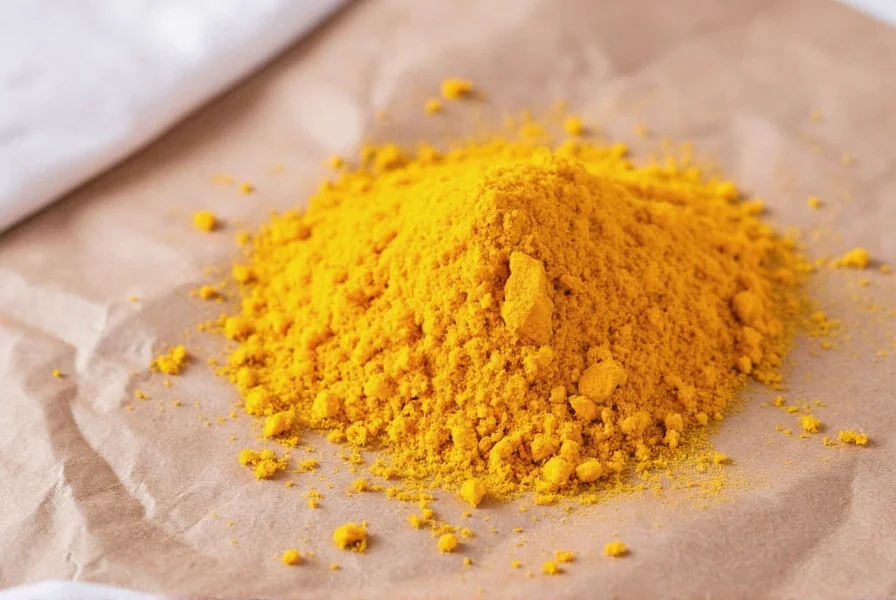Yes, scientific evidence indicates that turmeric, specifically its active compound curcumin, demonstrates anti-inflammatory effects. Multiple clinical studies show curcumin can reduce inflammatory markers by inhibiting key molecules like NF-kB, though effectiveness depends on formulation, dosage, and individual health factors. Most research uses concentrated curcumin extracts (typically 500-1500mg daily) rather than culinary turmeric due to bioavailability challenges.
When exploring natural approaches to managing inflammation, many people wonder: does turmeric help with inflammation? The answer lies in understanding both the promising research and important limitations of this ancient spice. Turmeric's primary active component, curcumin, has been extensively studied for its anti-inflammatory properties, with evidence suggesting it may benefit conditions like osteoarthritis, rheumatoid arthritis, and metabolic syndrome-related inflammation.
Unlike pharmaceutical anti-inflammatories that often come with significant side effects, turmeric offers a potentially gentler alternative. However, the effectiveness of does turmeric reduce inflammation naturally depends heavily on proper formulation. Raw turmeric powder contains only about 3% curcumin, and this compound has notoriously poor bioavailability when consumed alone.
The Science Behind Turmeric and Inflammation
Curcumin works through multiple pathways to combat inflammation. Research published in the Journal of Medicinal Food demonstrates that curcumin inhibits NF-kB, a molecule that triggers inflammation at the cellular level. It also reduces levels of inflammatory enzymes like COX-2 and 5-LOX, similar to how non-steroidal anti-inflammatory drugs (NSAIDs) work, but through different mechanisms.
A comprehensive 2022 meta-analysis in Nutrients reviewed 39 clinical trials involving over 3,000 participants. The analysis concluded that standardized curcumin formulations significantly reduced inflammatory markers like C-reactive protein (CRP) and interleukin-6 (IL-6), particularly in people with metabolic disorders and arthritis. However, the researchers noted substantial variability in outcomes based on the curcumin formulation used.
How Turmeric Compares to Conventional Treatments
When evaluating how turmeric compares to ibuprofen for inflammation, research shows interesting parallels. A landmark study in the Journal of Alternative and Complementary Medicine found that 1,200mg of curcumin daily provided comparable pain relief to 800mg of ibuprofen for knee osteoarthritis patients, but with significantly fewer gastrointestinal side effects.
| Comparison Factor | Curcumin | NSAIDs (e.g., Ibuprofen) |
|---|---|---|
| Anti-inflammatory Mechanism | Multitargeted (NF-kB, COX-2, LOX) | Primarily COX inhibition |
| Onset of Action | 2-4 weeks for noticeable effects | Hours to days |
| Gastrointestinal Side Effects | Rare at standard doses | Common (ulcers, bleeding) |
| Cardiovascular Risk | Neutral or potentially protective | Increased risk with long-term use |
"Curcumin's multitargeted approach to inflammation makes it particularly valuable," explains Dr. Sarah Chen, a nutritional biochemist at Stanford University. "While NSAIDs primarily block one pathway, curcumin modulates multiple inflammatory mechanisms simultaneously, which may explain why some patients respond better to it than conventional medications."

Practical Guidance for Using Turmeric
Understanding how much turmeric for inflammation is crucial for effectiveness. Most clinical studies showing benefits use:
- Standardized curcumin extracts providing 500-1,500mg of curcumin daily
- Formulations enhanced with piperine (from black pepper) to improve absorption by up to 2,000%
- Liposomal or nanoparticle formulations that bypass traditional bioavailability issues
For culinary use, adding 1-2 teaspoons of turmeric to meals provides only about 60-120mg of curcumin—far below research-backed doses. To maximize absorption when using regular turmeric powder, combine it with:
- Black pepper (contains piperine)
- Healthy fats (olive oil, coconut milk)
- Heat (cooking enhances solubility)
Safety and Considerations
While generally safe, side effects of turmeric for inflammation can include:
- Mild digestive upset at high doses
- Increased bleeding risk when combined with blood thinners
- Potential interactions with diabetes medications
- Yellow staining of fabrics and surfaces
The National Institutes of Health considers curcumin safe at doses up to 8,000mg daily in clinical trials, though most benefits are seen at much lower amounts. People with gallbladder issues should consult a physician before using high-dose curcumin, as it may stimulate bile production.
Realistic Expectations for Inflammation Relief
When considering how long does it take turmeric to reduce inflammation, research suggests most people notice improvements after 4-8 weeks of consistent use with a high-quality, bioavailable formulation. Unlike NSAIDs that provide immediate but temporary relief, curcumin works more gradually by addressing underlying inflammatory processes.
A 2023 study tracking patients with rheumatoid arthritis found that CRP levels (a key inflammation marker) decreased by 32% after 12 weeks of taking 1,000mg of enhanced curcumin daily. Participants reported reduced joint stiffness and pain, though complete symptom resolution was rare.
"Turmeric isn't a magic bullet," cautions Dr. Michael Rodriguez, a rheumatologist at Johns Hopkins. "For acute inflammation flares, it won't replace conventional treatments. But as part of a comprehensive approach including diet, exercise, and stress management, it can be a valuable tool for managing chronic inflammation with fewer side effects."
Choosing Effective Turmeric Products
Not all turmeric supplements deliver equal benefits. When selecting products for best turmeric supplement for inflammation, look for:
- Certified standardized extracts (typically 95% curcuminoids)
- Bioavailability enhancers (piperine, phospholipids, or nanoparticle technology)
- Third-party testing seals (USP, NSF, ConsumerLab)
- Transparent labeling of curcumin content per serving
Avoid products with vague labeling like "proprietary blend" or those that don't specify curcumin content. Quality supplements typically cost $30-$50 for a one-month supply, while ineffective products often sell for much less.
Conclusion: Evidence-Based Approach to Turmeric for Inflammation
The question does turmeric help with inflammation receives a qualified yes from current scientific evidence. Curcumin demonstrates meaningful anti-inflammatory effects across multiple studies, particularly for chronic inflammatory conditions. However, effectiveness depends on using properly formulated products at adequate doses, with realistic expectations about timing and degree of benefit.
For those considering turmeric as part of an inflammation management strategy, consult with a healthcare provider to ensure it complements rather than interferes with your existing treatment plan. When used appropriately, turmeric represents a promising natural option with a favorable safety profile compared to many conventional anti-inflammatory medications.
Frequently Asked Questions
How much turmeric should I take daily for inflammation?
Research shows effective doses typically range from 500mg to 1,500mg of standardized curcumin extract daily. Culinary turmeric provides only about 3% curcumin, so you'd need 15-30g of powder to reach these levels—which isn't practical. Most quality supplements provide 500mg of curcumin per capsule, often enhanced with piperine for better absorption. Start with 500mg once or twice daily and consult your healthcare provider for personalized recommendations.
How long does it take for turmeric to reduce inflammation?
Most clinical studies show measurable reductions in inflammatory markers after 4-8 weeks of consistent use with a bioavailable curcumin formulation. Some people notice symptom improvement within 2-3 weeks, while others may require 12 weeks for significant benefits. Unlike NSAIDs that provide immediate but temporary relief, curcumin works gradually by addressing underlying inflammatory processes. Consistency is key—taking it daily with food and healthy fats enhances absorption and effectiveness.
Can turmeric replace my anti-inflammatory medication?
Turmeric should not replace prescribed anti-inflammatory medications without consulting your healthcare provider. While research shows curcumin can be effective for some inflammatory conditions, it works differently than pharmaceuticals and may not provide sufficient relief for everyone. Many healthcare providers recommend using turmeric as a complementary approach rather than a replacement. If you're considering changing your medication regimen, discuss this with your doctor to ensure a safe transition that maintains proper inflammation control.
What's the best way to take turmeric for maximum absorption?
For maximum absorption, take turmeric (or curcumin supplements) with black pepper and healthy fats. Piperine in black pepper can increase curcumin absorption by up to 2,000%. Look for supplements that already contain piperine (typically labeled as BioPerine®) or take regular turmeric with a pinch of black pepper. Consuming with fats like olive oil, avocado, or nuts also enhances absorption since curcumin is fat-soluble. Taking it with a meal rather than on an empty stomach further improves bioavailability and reduces potential digestive upset.
Are there any conditions where I shouldn't use turmeric for inflammation?
Certain conditions warrant caution with turmeric: people with gallbladder disease should avoid high doses as it may stimulate bile production; those taking blood thinners should consult their doctor due to potential interactions; and individuals with diabetes should monitor blood sugar as turmeric may enhance medication effects. Pregnant women should stick to culinary amounts rather than supplements. If you have gastroesophageal reflux disease (GERD), high doses might worsen symptoms. Always discuss with your healthcare provider before starting turmeric supplements if you have any medical conditions or take prescription medications.











 浙公网安备
33010002000092号
浙公网安备
33010002000092号 浙B2-20120091-4
浙B2-20120091-4